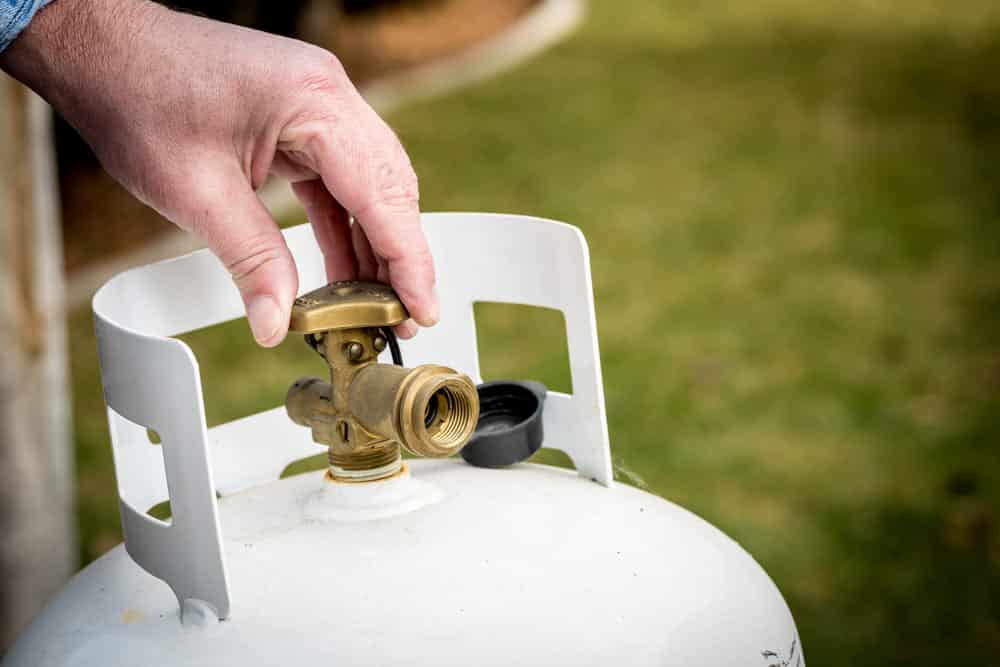
Many propane tank owners have no idea about how their tank functions. So before we give you a run-down of getting your propane tank to open again and why it may not be opening, you must know how it functions.
Whether you have stoves, grills, RVs, water heaters, and fireplaces fuelled by propane, knowing how the tank works will help you in solving minor problems that arise.
A propane tank is filled with propane liquid, converted by a special machine that uses pressure to liquefy propane gas. It remains that way until the valve is turned; the gas converts to vapor with the decreasing pressure and is carried through the valve openings.
If you have any of these appliances and frequently use propane tanks, sometimes minor issues arise with your tank. If you cannot open a propane tank, which is a common problem people face, we have compiled some solutions for you in this article.
Propane Tank Not Turning On
1. Empty Tanks Don’t Open
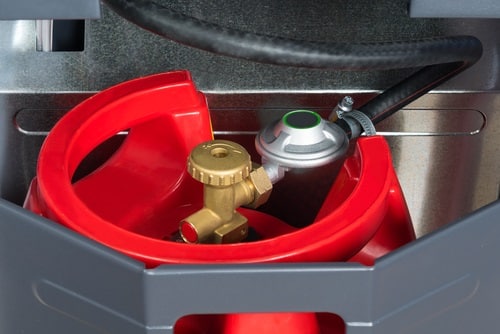
Propane tanks are generally heavy. If you are lifting it and finding it lighter than before, it is most likely empty. Sometimes tanks can feel full but have no gas at all. The next step is to check the propane grill tank gauge level indicator to see the gas level in your propane tank. If it is empty, you will have to get it re-filled.
To prevent your tank from becoming empty, installing smart technologies such as tank monitors may save you a lot of time, energy, and money. Tank monitors alert propane tank service members to come and fill up your tank again. They don’t just alert tank fillers but also alert you.
This will prevent you from being confused about why your tank is not opening, and you can re-fill it again. Many smart tank appliances also give users weekly updates on how much propane they have remaining in their tanks.
2. Don’t Open Over-filled Tanks
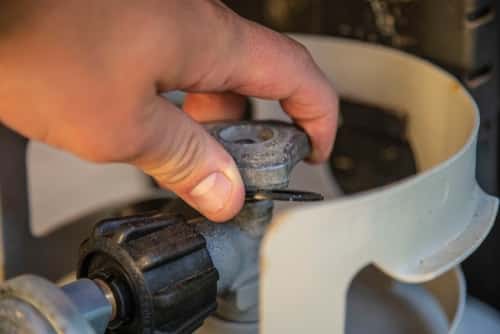
The best way to tell if your tank is over-filled is if gurgling sounds are coming from it. Opening tanks like this can cause a sudden shift in the already strained regulator. This causes your regulator to become faulty in propane distribution.
The way to tell if your tank is over-filled is if, before the gurgling noise, you were experiencing low heat and weak flames. Never attempt to leak out extra gas from your propane tank yourself- always consult a professional to do it for you.
3. Hose Attachments Needs to Be Firm
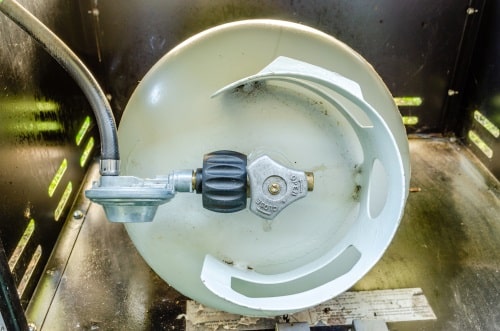
Propane tanks are equipped with many safety features to prevent gas leakage and accidents caused by gas leakage. One of these is the hose attachments that pump the gas out of the propane tank into your grill.
For propane tanks to open, the hose attachments must have a firm and secure connection with the tank. If there seems to be no problem with the hose attachment, you need to check the screw-on or safety valves.
If they are screwed in the wrong direction or have become loose, you need to fix them so you can open your propane tank. Loosen your hose attachments, safety valves, and any other plug-ins on your tank, and then put them on the right way for your tank to open.
Moreover, the gas flow, especially on grills, is managed by the regulator. It is connected to the propane tank, and many tanks will use hoses to push gas onto the grill.
Grills mainly collect more dirt, grime, and debris, which can clog the hose attachments. This may be why your propane tank might not open. Remove the hose to clean it with soap and water, then test the connection to see if it has been properly attached.
4. Check Your Connectors
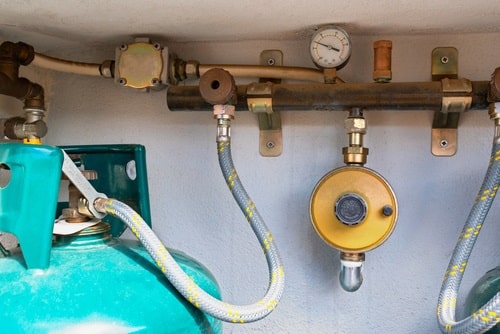
Maintaining connectors and checking them routinely ensures that your tank remains functional. Without a proper connector, your propane tank might not open. Your connector has to be long enough to depress the check value.
If it is not long enough, it won’t sufficiently depress the check value, which might also prevent your tank from opening. The proper length of the connector must be at least one inch long to depress the check value correctly.
Calling a technician to replace your connector is the best call to make. However, it would be best not to tinker away on your propane tank yourself because it is unsafe. Also, don’t attempt to force open the tank since there is a major fire hazard involved.
5. Don’t Turn Your Valve All the Way
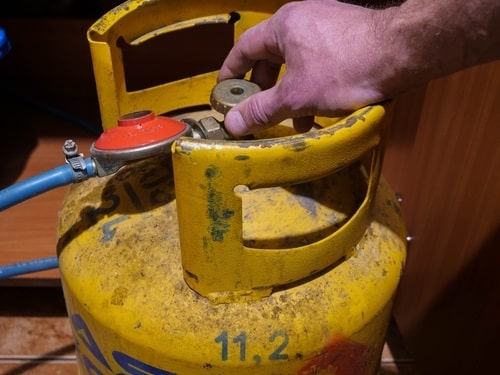
If you want to increase the level of flame on a grill connected to propane tanks, you should do it at frequent intervals. The increment should also be small. Turning the valve all the way doesn’t increase functionality or improve the flame.
Instead, it will shut the propane tank down. If you have turned the valve all the way and are wondering why your propane tank is not opening, it’s because the valve serves the purpose of a safety feature. It is meant to control large amounts of propane being released accidentally.
6. Stuck Valves Block Your Tank from Opening
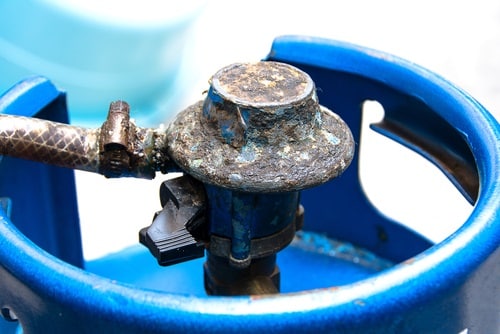
If your tank valve is stuck and won’t budge, then your propane tank will not open. Rust formation, substances clamping onto the valve, or excessive tightening can cause the valve to become stuck.
It is not safe to take general tools and attempt to loosen the stuck valve since propane tanks are highly flammable, and any punctures or cracks can result in disaster.
Moreover, if the valve handle is too damaged by excessive force, you may have to throw it away completely. Call a technician to loosen the valve for you. To make sure your valve is always functioning, keep your tank away from moisture and extreme temperatures.
7. Faulty and Frozen Regulators
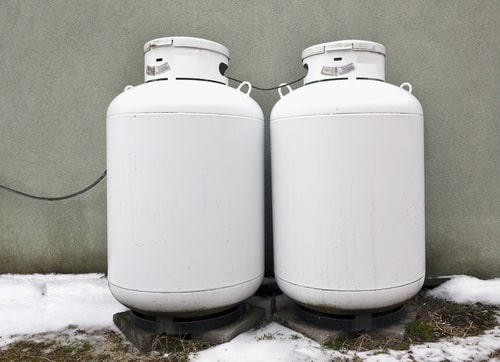
If you use propane tanks attached to grills, another problem area causing your tank not to open may be regulators. Regulators generally need regular maintenance, and faulty regulars prevent propane flow, cause overflow, and force the tank shut.
Firstly, you must check all tubes, valves, and grills to see if dirt or grime needs clearing. Holes and dents need to be repaired immediately since leaks can be deadly. Avoid using house cleaning materials and wire sponges to clean your propane tank regulators.
The best call to make is to hire a technician to replace the regulator completely. Faulty regulators also cause problems with the hoses, so you should hire a technician to replace both for you for your propane tank to open.
If you have performed a DIY repair on your regulator, always check for leaks before using the propane tank. Use a mixture of water and detergent in a small amount to cover the regulator.
Make sure the soapy solution covers the whole regulator, especially hose connections. Turn the gas on slowly to avoid wastage. If bubbles form, the regulator is leaking, and you must get it replaced as soon as you can.
8. Frost Formation
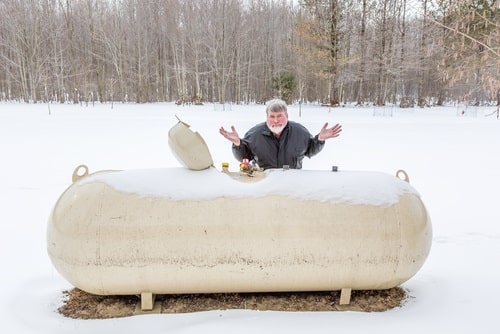
Most people don’t think that frost will form on a device that carries gas to burners and grills. However, propane tanks have safety features to prevent the leakage of flammable propane gas. These features cause the formation of ice and frost around the tank as a safety measure.
Often, liquid propane leakage is prevented in cold temperatures by the solidification process. To properly use the tank or open it again, removing the frost from the surface is very important.
Firstly, switch off the propane tank by disconnecting it. Wait for fifteen minutes once it is switched off and then turn the hand-wheel once. Remember not to turn it all the way!
If your regulator is frozen, you need to take it off the propane tank, bring it indoors and let it thaw out to loosen to frost. Reattach it onto the tank the next day, and it should work just fine. If you are having trouble finding out whether your regulator is bad, some indications are to look for.
Roaring noises from grills and burners, flames at the air intakes, heavy deposits of soot, flames floating above grill ports are all signs that your regulator needs to be replaced.
Tank Still Not Opening? Call the Technician
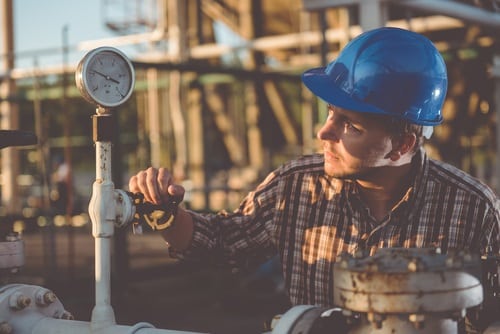
Propane is a flammable gas. While minor problems can be fixed using regular materials, qualified professionals are always better suited to handle your propane tank. They are well-versed in industry regulations and methods, so you should always consult their expertise.
Doing the job yourself may cause more damage to your tank, cause accidents, and lose money. So if your propane tank is not opening, call a propane tank maintenance specialist to fix it for you.
Conclusion
By now, your tank should be up and running without any problems. If not, you should call professionals to see what the issue is. If the tank cannot be fixed, you can always look for options to purchase a new one.